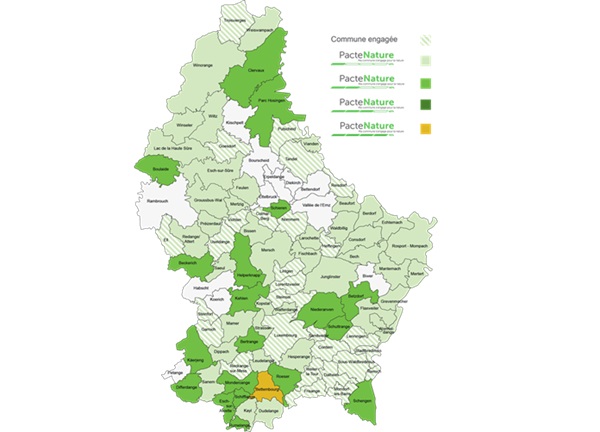 Credit: Klima Agence
Credit: Klima Agence
On Friday 28 June 2024, the second edition of the Nature Pact Day took place in the municipality of Niederanven in the presence of Serge Wilmes, Luxembourg’s Minister of the Environment, Climate and Biodiversity.
This event was an opportunity to reward the 30 recently certified municipalities and to allow stakeholders in the sector to learn and exchange information.
The Nature Pact is an instrument designed to promote municipal initiatives aimed at preserving and restoring biodiversity. It is also a national tool which, thanks to the diversity of the subjects covered, allows municipalities to know the state of natural spaces in their municipal territory. By establishing an initial inventory, the catalogue of measures highlights the strengths and weaknesses of the municipalities. This is the starting point that allows municipalities to establish their strategy for the years to come and to focus on priority measures that advance biodiversity restoration and adaptation to climate change in the municipal territory.
Review of the Nature Pact: three years of progress for biodiversity
Since the launch of the Nature Pact three years ago, in July 2021, numerous nature and biodiversity restoration measures have been implemented by municipalities. Despite the challenges posed by measures targeting natural resources in open and aquatic environments, it is essential to maintain efforts to restore these natural spaces, the ministry stressed. In other areas of the Nature Pact, the results are encouraging with an average of 55% of points achieved for the "Communication and cooperation" chapter, 50% for the "Establishment of a General Strategy" chapter, 50% for the forest environment, and 43% for the chapter concerning measures implemented at the "Urban environment" level.
The establishment of a general nature protection strategy is one of the central measures of the Nature Pact since it allows municipalities to give themselves a plan for the implementation of measures in a targeted manner. Awareness-raising and communication remain essential pillars to which municipalities give considerable importance, the ministry noted. It also deems it important that municipalities continue to implement measures at the forest level, such as the designation of integral forest reserves and measures promoting the increase of forest resilience so that they can cope with climate change. In cities and villages, the ministry added that particular attention must continue to be paid to the management and extensive development of green spaces, the greening of neighbourhoods, but also the establishment of infrastructure in favour of wildlife.
Awarding of 30 certifications
The Nature Pact Day, which brought together 190 participants, was an opportunity to reward municipalities for their efforts and to highlight the important role of municipal actors and political decisions in the protection of nature and natural resources. In this context, the Minister Wilmes, highlighted the holistic and structured approach of the Nature Pact: "The Nature Pact is an exemplary instrument for promoting the significant commitment of municipalities to the preservation of natural resources and the greening of the urban environment. Faced with the challenges posed by climate change and the loss of biodiversity, it helps ensure resilient municipalities and maintain a high quality of life for future generations." The Nature Pact provides for four levels of performance that are validated by an independent auditor and which provide access to subsidies for the implementation of additional measures: "Basic Certification" (40%), "Bronze" (50%), "Silver" (60%) and "Gold" (70%). Since its creation in 2021, 88 municipalities have already committed to the Nature Pact, according to the ministry. Among the municipalities involved, 40 have managed to achieve Basic Certification, nineteen are certified "Bronze" and the municipality of Bettembourg has particularly distinguished itself by achieving the highest possible level, namely "Gold".
Thematic programme and field visits
During the Nature Pact Day 2024, particular attention was paid to the projects and measures implemented in the region. Indeed, various field visits were organised in the region in connection with the measures of the Nature Pact.
Thus, the "Aarnescht" and "Mensder Brill" nature reserves were visited and the participants attended a demonstration of sustainable management of communal forests with horses. They were also able to explore projects within the urbanised area and discover a range of measures that help preserve biodiversity in cities and villages.
Finally, the discovery of open landscapes, their sensitive ecosystems, and the crucial role of farmers in these environments was also on the agenda.
The day continued with presentations on the latest news from the Nature Pact and various projects, including those rewarded as part of the call for projects "Méi Natur an eise Stied an Dierfer" (more nature in our cities and villages). The conference ended with the presentation of the 30 certifications to the deserving municipalities.








